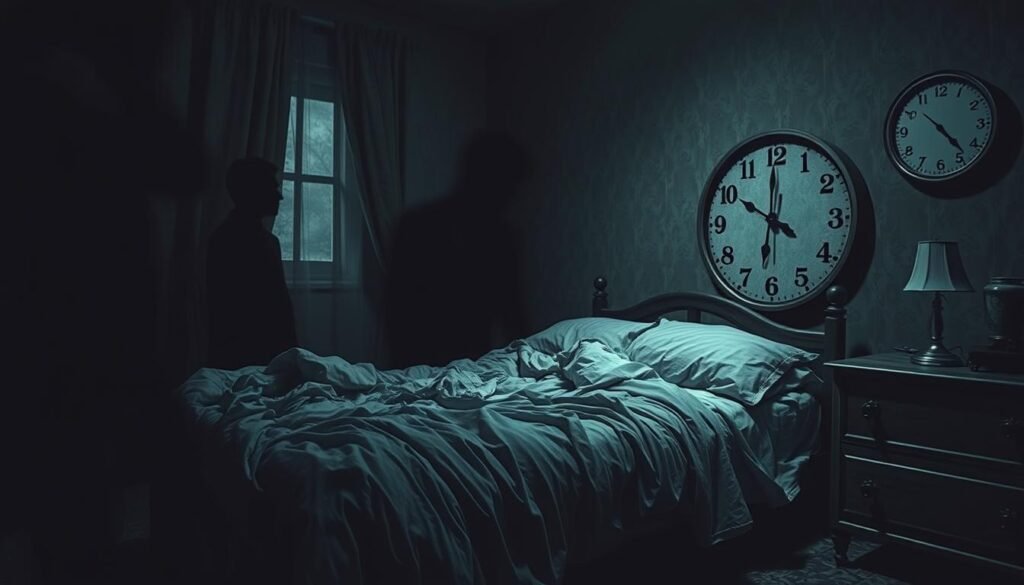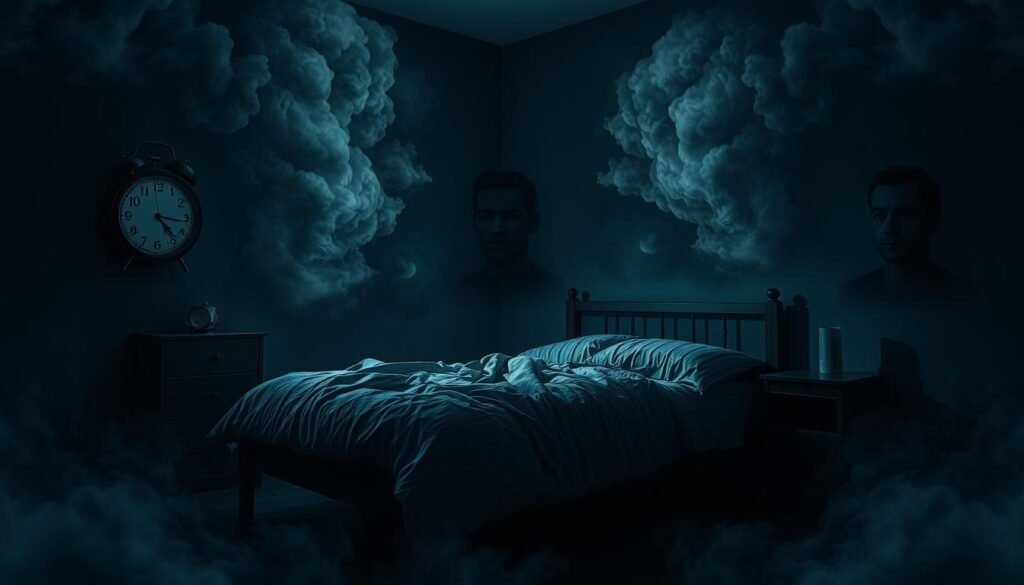Did you know that nearly one in three adults reported insomnia symptoms during the pandemic? This fact shows how common sleep problems are and how they’re linked to mental health, especially anxiety. People dealing with stress often forget the importance of good sleep. They end up in a tough cycle where anxiety makes sleep issues worse.
The question of whether lack of sleep leads to anxiety is now more relevant than ever. Research shows a strong link between how well we sleep and how we handle emotions. With the pandemic making things harder, it’s crucial to understand how sleep loss affects mental health and anxiety.
Key Takeaways
- Over 30% of adults experience inadequate sleep, contributing to mental health challenges.
- Insufficient sleep can heighten anxiety levels and worsen mental health outcomes.
- Sleep disturbances have been prominently linked to increased stress and anxiety during the pandemic.
- Addressing sleep issues can be a vital part of anxiety management strategies.
- Sleep quality directly affects emotional well-being and cognitive functions.
The Importance of Sleep for Mental Health
Getting enough sleep is key to keeping your mind healthy and your emotions balanced. When we don’t sleep enough, it’s harder to handle our emotions. This can make anxiety and other mental health problems worse. Sadly, one in three adults in the US don’t get the sleep they need. This shows how big an issue it is. It’s very important for people dealing with a lot of stress to understand how sleep affects their anxiety.
How Sleep Impacts Emotional Regulation
Sleep is very important for controlling our emotions. People who sleep less than six hours might face more mental health challenges. Research links good sleep to feeling emotionally well. Without enough sleep, we can react badly to stress. This highlights how sleep and managing our feelings are connected.
Sleep and Cognitive Functions
Sleep affects our thinking skills too, like attention, memory, and learning. Lack of sleep can make focusing and making decisions harder. This increases stress and anxiety. Many people, like college students, can’t sleep well. Up to one in four students have insomnia. This shows how critical sleep is for our brain functions, reducing anxiety, and staying mentally healthy.
Understanding Sleep Deprivation Anxiety
Sleep and anxiety are closely linked, affecting our mental health deeply. Not getting enough sleep can make anxiety worse, leading to more stress. Knowing how sleep affects anxiety helps us find ways to feel better mentally.
Link Between Sleep Quality and Anxiety Levels
Poor sleep can make anxiety symptoms worse. People with insomnia struggle with thoughts that won’t slow down, making good sleep hard to find. A study found people with insomnia are much more likely to become depressed than those who sleep well. Since 75% of depressed people also have trouble sleeping, it’s clear sleep and mental health are connected.
Effects of Sleep Deprivation on Mood
Not sleeping enough can make you feel down or anxious. Those who don’t get enough sleep often feel more stressed and emotionally upset. Lack of sleep can mess with your hormones, making you crave junk food. This can lead to weight gain, making sleep issues worse. Studies show that even a little sleep loss can make people feel paranoid or think about suicide. Techniques like deep breathing and cognitive behavioral therapy help manage stress, improving your mood and sleep.
| Aspect | Impact of Sleep Deprivation |
|---|---|
| Risk of Depression | Tenfold increase for those with insomnia |
| Difficulty Falling Asleep | 75% of depressed individuals experience troubles |
| Emotional Vulnerability | Difficulties in regulating emotions can lead to future issues |
| Self-Management Techniques | Cognitive behavioral therapy can enhance sleep quality |
Does Lack of Sleep Cause Anxiety: Exploring the Science
Many studies link sleep shortage to higher anxiety levels. About 70 million people in the US don’t get enough sleep. This makes it a major health concern. To understand if sleep loss leads to anxiety, we must consider many factors. These range from short episodes to chronic conditions.
Research Findings on Sleep and Anxiety Correlation
Short amounts of sleep loss, like 36 hours, can really raise anxiety in healthy people. The Mood and Anxiety Symptom Questionnaire (MASQ) showed sleep-deprived individuals felt more distressed. They had stronger symptoms of anxiety and depression. This information is crucial for understanding how sleep loss impacts our minds.
Psychological Mechanisms Behind Sleep Deprivation Effects
Not getting enough deep sleep can make us anxious. This lack of sleep raises our body’s alertness, making us feel uneasy. It affects our feelings and our thinking, making us irritable and moody. Good sleep is key for our mental health and easing anxiety symptoms. For more details, check the American Psychological Association or learn about anxiety’s physical signs at Mood Care Health.
Impact of Sleep Disorders on Mental Health
The link between sleep issues and anxiety is clear. Many people with anxiety often have sleep disorders, like insomnia. Knowing how these problems connect can help us understand both better.
Common Sleep Disorders and Their Symptoms
Different sleep disorders affect people in unique ways. They all have symptoms that can hurt our mental health. Let’s look at some common ones:
- Insomnia: It makes falling asleep, staying asleep, or getting good sleep hard. About one-third of people deal with it, and it’s linked to anxiety.
- Sleep Apnea: This causes breathing to stop and start during sleep, leading to daytime tiredness. People with this disorder often feel anxious.
- Narcolepsy: This leads to sudden sleep attacks, causing stress and raising anxiety levels.
| Sleep Disorder | Common Symptoms |
|---|---|
| Insomnia | Problems with falling asleep, staying asleep, or waking up early |
| Sleep Apnea | Stopping breathing during sleep, feeling very tired during the day |
| Narcolepsy | Unexpected sleeping, feeling very sleepy during the day |
Prevalence of Insomnia in Anxious Individuals
The link between insomnia and anxiety is well known. About 75% of people with depression also can’t sleep well. With over 300 million people worldwide dealing with depression, and about 20% of U.S. adults with anxiety, it’s a big issue. Anxiety often leads to more sleep problems, making things worse.

There’s a high rate of insomnia among U.S. veterans with combat-related PTSD, about 90%. Also, 50% to 80% of those getting mental health care have sleep issues. This shows how widespread the problem is.
By understanding how sleep disorders and anxiety relate, we can find better ways to treat them. This could improve life for many people dealing with these issues.
Relationship Between Sleep and Anxiety: Key Studies
Looking into how sleep and anxiety are linked offers deep insights into mental health. Studies show that not sleeping well often leads to feeling more anxious. This creates a cycle where each affects the other. We will now look at key research on this topic.
Overview of Recent Research Findings
Recent studies find that many with sleep issues also have anxiety disorders. About 24% to 36% of people with insomnia have these disorders. Those with hypersomnia have a 27% to 42% chance. Sleeping poorly can make anxiety disorders worse, including GAD and PTSD. Research shows the relationship between sleep problems and anxiety is complex.
Sleep Loss and Its Emotional Consequences
Not getting enough sleep does more than make you tired. It can lead to increased anxiety, affecting many with GAD. Animal studies on anxiety show mixed results. This makes applying findings to human treatment difficult. However, not sleeping well is closely linked to higher anxiety levels. It’s a major risk factor for developing anxiety issues.
| Sleep Condition | Prevalence of Anxiety Disorders |
|---|---|
| Insomnia | 24% to 36% |
| Hypersomnia | 27% to 42% |
| Anxiety Disorders Correlated with Sleep Disturbances | 50% prevalence as a common feature |
How Sleep Affects Anxiety Levels
Sleep deeply influences anxiety levels. Studies show sleep patterns play a big role in emotional health. When these patterns are off, people feel more anxious and find daily challenges harder to handle.
The Role of Sleep Architecture
Good sleep is key for thinking clearly and feeling balanced. Bad sleep upsets hormones and raises anxiety. Long-term poor sleep can make cortisol levels spike. This causes more worry and even physical issues like a fast heartbeat.
People not sleeping enough might feel panicky or moody. They can also face heart problems.
Anecdotal Evidence from Sleep Deprivation Studies
Many studies show that lack of sleep boosts anxiety. Those missing sleep feel more stressed upon waking. They also struggle more with everyday stressors.
Not getting enough sleep does more than make you tired. It can harm brain function, leading to paranoia. Alarmingly, many teens and adults in the U.S. fight with anxiety. These studies highlight the link between sleep and mental health.

Seeking Solutions: Importance of Sleep for Anxiety Management
Getting enough sleep is key for handling anxiety well. Good sleep can greatly reduce feelings of anxiety. Many people see benefits from adopting healthy sleep habits.
Healthy Sleep Practices to Combat Anxiety
Here are ways to improve sleep and feel better:
- Consistent Sleep Schedule: Sleeping and waking up at the same times each day helps your body’s clock.
- Relaxing Bedtime Environment: A quiet, dimly lit space makes it easier to fall asleep.
- Limit Caffeine and Alcohol: Avoiding these before bed helps your body get ready to rest.
- Regular Physical Activity: Exercise helps with sleep, but don’t work out too late in the day.
Adopting these sleep habits can greatly help with anxiety. Studies show that better sleep leads to much lower anxiety. Improving your sleep is a strong step for those with anxiety issues, showing how sleep and mood are connected. For more info, check out sleep and mental health here.
When to Seek Professional Help for Sleep Issues
If sleep problems don’t improve, it’s important to seek help. Long-term lack of sleep can make anxiety worse. A healthcare provider can offer treatments like CBT-I or medications. These can ease anxiety and help with sleep. Getting help early is crucial for dealing with sleep and anxiety issues.
Influence of Lifestyle Choices on Sleep Quality
Lifestyle choices significantly affect sleep quality. This, in turn, influences anxiety levels. Diet and screen time greatly impact our nightly rest and recovery.
Dietary Factors That Affect Sleep
The link between dietary factors that affect sleep and sleep quality is clear. Drinking caffeine late in the day can cause sleep problems. Similarly, eating sugary foods can make it hard to sleep well.
Adjusting when you eat and choosing a balanced diet helps. Foods rich in magnesium and tryptophan improve sleep quality.
Impact of Screen Time and Sleep Hygiene
Too much screen time at night is a big problem for the impact of screen time and sleep hygiene. The blue light from devices can mess up our sleep cycle. It makes falling asleep hard.
A study showed over 95% of college students use their phones before bed. This affects their sleep. Having good sleep habits is key. Limiting screens at night and a calming routine help with better sleep. This also helps lower anxiety.

Understanding the Effects of Sleep Deprivation on Psychology
Sleep deprivation is a big challenge. It can affect your mental health in big ways. It is important to know the difference between short-term and long-term sleep loss.
Acute vs Chronic Sleep Deprivation and Their Distinctions
Acute sleep deprivation happens over a short period. It causes anxiety and makes it hard to think clearly. Chronic sleep deprivation happens over time and leads to serious health problems. It can cause anxiety and depression.
Connection with Depression and Elevated Stress Levels
There is a strong link between not getting enough sleep and feeling depressed. About one-third of adults in the U.S. don’t get enough sleep. This causes health problems. People who can’t sleep well are more likely to become depressed. Sleep problems make stress worse and hurt your mental health. It’s very important to solve sleep problems for good health. For tips on handling sleep deprivation, check this helpful resource.
| Type of Sleep Deprivation | Short-term Effects | Long-term Effects |
|---|---|---|
| Acute | Higher anxiety levels | Potential for mood disorders |
| Chronic | Cognitive decline | Increased risk of depression, heart issues, and obesity |
It’s very important to work on sleep quality. Improving sleep can help reduce anxiety and depression. This will make you feel better overall.
Conclusion
Sleep is key to managing anxiety, research shows. Many suffer from bad sleep, made worse by today’s challenges. The connection between little sleep and more anxiety is clear. Sleep helps control emotions and think clearly.
It’s important to know if lack of sleep causes anxiety. Not sleeping enough can make us less able to handle stress. This can make anxiety worse. So, good sleep habits are crucial for feeling well and less anxious.
Talking and learning more about sleep and anxiety is important. If we sleep better, we can handle mental health better. Healthier sleep improves our lives. It helps us face challenges with a more positive outlook.